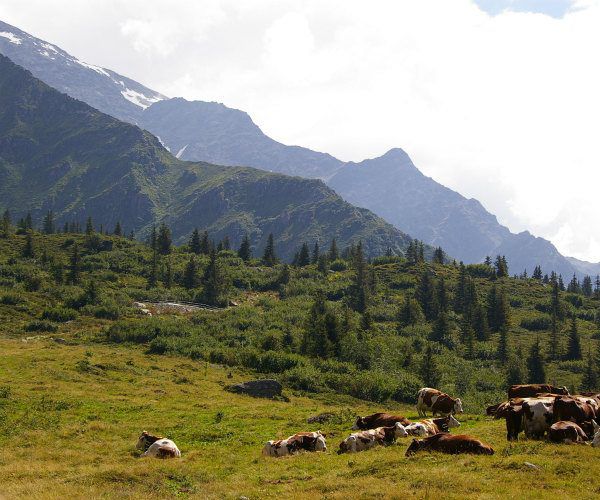
What do you get when three countries with some of the best culinary traditions in the world converge in one area? A gastronomic region of immense proportions. While the area around Mont Blanc spanning France, Italy, and Switzerland is known for big cheese names such as Gruyere and Fontina, there are many smaller cheesemakers that produce specific cheeses from individual valleys, and in some cases, a single village! Visiting Le Refuge Payot cheese shop in Chamonix, you’ll definitely come across new and unknown varieties unlikely to be found outside of France. Check out your country’s customs laws before bringing it back home!
While hiking in the Alps on famous routes such as the Tour du Mont Blanc or the Haute Route, you’ll find firm, alpine-style cheeses such as Beaufort, which is made from raw cow’s milk. The flavor changes depending on whether the cheese was made from spring milk or fall milk, as the grasses, flowers, and weeds the cows graze on in the mountains are different in each season. Morbier is a semi-soft cow’s milk cheese with a characteristic line of vegetable ash in the middle that is rich and creamy. Reblochon may be a bit stinky, but it’s light and nutty and one of the most popular cheeses of the region.

A typical dish on menus in the French Alps and the French side of Switzerland is Raclette. This is both the name of the dish and the name of the cheese. A half wheel of cheese is brought to the table and melted under a broiler. When the top layer gets gooey, tilt the wheel, scrape the melted part onto a plate, and eat it with ham, bread, or potatoes. Return it to the broiler for the next round. Just like fondue (seen in the German part of Switzerland), it’s rather decadent and a lot of fun when everyone partakes.

The vineyards in this region cling to steep hillsides, and the area just south of the Italian town of Courmayeur is home to the highest vineyards in Europe (at almost 4,000 ft or 1,200 m!). Many of the lesser-known grape varieties are rarely found outside of the Mont Blanc region. Well-known ones include Sauvignon Blanc and Gamay from the area around Geneva; Syrah from Valais (Switzerland’s largest wine producing region) in the Rhone Valley; Altesse and Mondeuse from France’s Savoy region; and Pinot Gris and Pinot Noir from the entire area including Italy’s Aosta Valley. It’s such a concentrated area for wine producers, it’s easy to try a different label each night, especially small wineries that don’t export.

Of course, there is more to eat than just cheese—the rest of the cuisine really punctuates an already fabulous destination. From homemade pastas and risotto in Italy, to blueberry tarts and croissants in France, to lake-caught fish and hearty stews in Switzerland. No one goes hungry here! To burn off the extra calories, head into the mountains where a plethora of trails await day-hikers and long distance hikers alike.

By Matt Holmes of www.boundlessjourneys.com
